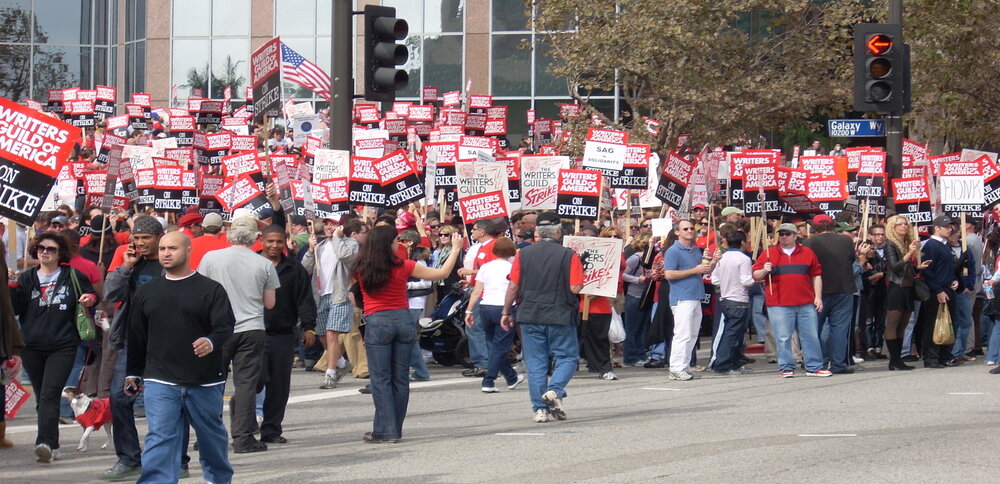By Mike Reynolds
Writers Guild of America (WGA) negotiators were unanimous in their rejection of the Alliance of Motion Picture and Television Producers’ (AMPTP) final offer before the Monday deadline, meaning they had no alternative but to recommend a strike order, with picket action to begin on Tuesday.
Everyone in the industry is worried about the WGA strike and understandably so because now the sector is facing a definite WGA strike. Come the end of June, everyone may well be facing a total shutdown. However, viewers won’t be starved for content and may not really notice enough to cause viewing hours to fall.
As far as viewers are concerned, while streamers are part of the WGA problem, they could also be their salvation during the length of the strike, no matter what plans traditional TV outlets had previously put in place to counter a strike.
First productions to be hit are the nightly broadcast network shows — ABC’s Jimmy Kimmel Live, CBS’ Late Show With Stephen Colbert, NBC’s Tonight Show Starring Jimmy Fallon and Late Night With Seth Meyers, as well as Comedy Central’s The Daily Show, which all shut down immediately. Additionally, weekly shows such as HBO’s Real Time With Bill Maher and Last Week Tonight With John Oliver, along with NBC’s SNL, will also go dark.
It is expected that reruns of these shows will fill the timeslots until the strike concludes. As an aside, this could be a bad sign for nightly chat show hosts, as ratings for such shows have dropped dramatically of late, and the recent departure of James Corden (and his The Late Late Show) from the scene may have happened just in time to save him from cancellation, as it has been widely reported that the show was losing $20 million a year.
Among other shows affected by the strike thus far are Abbot Elementary, Big Mouth, Cobra Kai, Night Court, Power Book III: Raising Kanan, The Talk, Yellowjackets and possibly Stranger Things.
Season two of House of the Dragon will continue filming in the U.K., as scripts have been completed for some time, so filming on the second season will not be affected.
Among the traditional TV outlets, FOX seems to have been ready to overcome a strike situation, according to Les Eisner, SVP of FOX Corporate Communications. “Since the season wraps in a few weeks, our scripted content for this season has already been written. During the pandemic we created an entire infrastructure that we use and refine to this day. With that in mind, we have a solid contingency plan in place that will ensure continuity of original programming until an agreement can be reached.”
Eisner’s comments seem to reflect the belief running through the industry that everyone has learned lessons from COVID and that TV studios have been making plans for months to counter a possible WGA strike by building a library, green-lighting early renewals of scripted shows, and gathering unscripted content.
Courtney Rowe, SVP of Corporate Communications for NBCUniversal, revealed that “we do not anticipate any immediate impact beyond our late night shows.”
Other studios were contacted for this story, but WBTV declined to comment and the rest did not get back in time for our press deadline.
During negotiations and since the strike was called, several writers have noted the multi-million dollar salaries and bonuses being received by the heads of companies they are dealing with. Writer/comedian Adam Conover was very public in his comments, revealed during a Tuesday CNN interview, “David Zaslav, the CEO of Warner Bros. Discovery, the parent company of the network I’m talking to you on right now, was paid $250 million last year, a quarter of a billion dollars! That’s about the same level as what 10,000 writers are asking him to pay all of us collectively, alright? So I would say if you’re being paid $250 million — these companies are making enormous amounts of money. Their profits are going up. It’s ridiculous for them to plead poverty.”
During negotiations the WGA stated, “Our chief negotiator, as well as writers on the committee, made clear to the studios’ labor representatives that we are determined to achieve a new contract with fair pay that reflects the value of our contribution to company success and includes protections to ensure that writing survives as a sustainable profession.”
The guild further noted that the studios’ responses to its proposals have been “wholly insufficient.”
“From their refusal to guarantee any level of weekly employment in episodic television, to the creation of a ‘day rate’ in comedy variety, to their stonewalling on free work for screenwriters and on AI for all writers, they have closed the door on their labor force and opened the door to writing as an entirely freelance profession.”
A report on the 2007-2008 WGA strike indicated the disappearance of about 37,000 California jobs, resulting in a $2.1 billion loss to the state economy. What might this strike do?











Leave A Comment